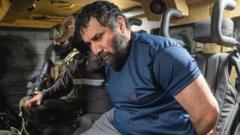The case raises questions about immigration policies and treatment of deported individuals in El Salvador.
**Allegations of Torture Surface Following Deportation of US Man to El Salvador**

**Allegations of Torture Surface Following Deportation of US Man to El Salvador**
Kilmar Ábrego García claims severe abuse in prison after return from the US.
Kilmar Ábrego García, a 29-year-old man from Maryland, has come forward with allegations of serious abuse and torture during his recent incarceration in El Salvador's notorious Terrorism Confinement Centre (CECOT). After being mistakenly deported to El Salvador in March 2025, legal documents revealed that upon his arrival at CECOT, Mr. Ábrego García endured "severe beatings" from guards, resulting in visible injuries within the first 24 hours.
Previously accused by the Trump administration of being affiliated with the Salvadorian gang MS-13—a claim his legal team and family staunchly deny—he was extradited in June to face human trafficking charges in Tennessee, to which he has pleaded not guilty.
Court filings indicate that Mr. Ábrego García, alongside 20 other newly deported inmates, experienced brutal treatment. The detainees were reportedly confined to cramped quarters with metal bunks devoid of mattresses, subjected to incessant bright lighting, and given scarce access to sanitation facilities. Additionally, the complaint detailed that he and the others were forced to kneel from 9 PM until 6 AM, with guards physically punishing any who collapsed from fatigue.
Mr. Ábrego García's dramatic weight loss of 30 pounds in his initial weeks of captivity underscores the dire conditions he endured. His plight counters El Salvador's President Nayib Bukele’s statements asserting that the nation’s prisons are well-maintained and free from abuse.
Despite the harsh realities reported, the Trump administration is seeking to dismiss the lawsuit filed by Mr. Ábrego García’s wife, asserting that circumstances have changed since his return to the US. Mr. Ábrego García initially gained protection from deportation in 2019 due to potential threats from gangs. He was brought back to the US only after a federal judge intervened following his wrongful deportation.
Attorney General Pam Bondi heralded his return, praising it as a victory for justice, while Mr. Ábrego García's defense has labeled the trafficking allegations as unfounded. Although he was deemed eligible for release by a judge, he remains incarcerated, largely due to concerns about another potential deportation. The situation highlights ongoing debates surrounding US immigration policies and the treatment of deported individuals.
Previously accused by the Trump administration of being affiliated with the Salvadorian gang MS-13—a claim his legal team and family staunchly deny—he was extradited in June to face human trafficking charges in Tennessee, to which he has pleaded not guilty.
Court filings indicate that Mr. Ábrego García, alongside 20 other newly deported inmates, experienced brutal treatment. The detainees were reportedly confined to cramped quarters with metal bunks devoid of mattresses, subjected to incessant bright lighting, and given scarce access to sanitation facilities. Additionally, the complaint detailed that he and the others were forced to kneel from 9 PM until 6 AM, with guards physically punishing any who collapsed from fatigue.
Mr. Ábrego García's dramatic weight loss of 30 pounds in his initial weeks of captivity underscores the dire conditions he endured. His plight counters El Salvador's President Nayib Bukele’s statements asserting that the nation’s prisons are well-maintained and free from abuse.
Despite the harsh realities reported, the Trump administration is seeking to dismiss the lawsuit filed by Mr. Ábrego García’s wife, asserting that circumstances have changed since his return to the US. Mr. Ábrego García initially gained protection from deportation in 2019 due to potential threats from gangs. He was brought back to the US only after a federal judge intervened following his wrongful deportation.
Attorney General Pam Bondi heralded his return, praising it as a victory for justice, while Mr. Ábrego García's defense has labeled the trafficking allegations as unfounded. Although he was deemed eligible for release by a judge, he remains incarcerated, largely due to concerns about another potential deportation. The situation highlights ongoing debates surrounding US immigration policies and the treatment of deported individuals.























